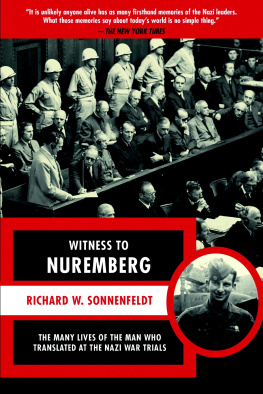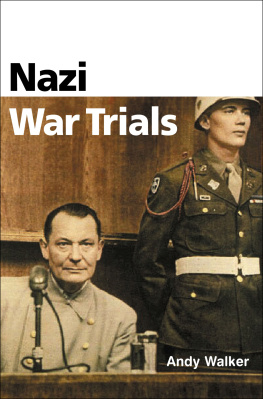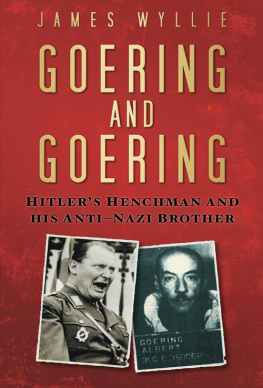Frischauer - Goering
Here you can read online Frischauer - Goering full text of the book (entire story) in english for free. Download pdf and epub, get meaning, cover and reviews about this ebook. year: 2013, publisher: Unmaterial Books, genre: Non-fiction. Description of the work, (preface) as well as reviews are available. Best literature library LitArk.com created for fans of good reading and offers a wide selection of genres:
Romance novel
Science fiction
Adventure
Detective
Science
History
Home and family
Prose
Art
Politics
Computer
Non-fiction
Religion
Business
Children
Humor
Choose a favorite category and find really read worthwhile books. Enjoy immersion in the world of imagination, feel the emotions of the characters or learn something new for yourself, make an fascinating discovery.

- Book:Goering
- Author:
- Publisher:Unmaterial Books
- Genre:
- Year:2013
- Rating:4 / 5
- Favourites:Add to favourites
- Your mark:
- 80
- 1
- 2
- 3
- 4
- 5
Goering: summary, description and annotation
We offer to read an annotation, description, summary or preface (depends on what the author of the book "Goering" wrote himself). If you haven't found the necessary information about the book — write in the comments, we will try to find it.
Goering — read online for free the complete book (whole text) full work
Below is the text of the book, divided by pages. System saving the place of the last page read, allows you to conveniently read the book "Goering" online for free, without having to search again every time where you left off. Put a bookmark, and you can go to the page where you finished reading at any time.
Font size:
Interval:
Bookmark:
WILLI FRISCHAUER
First published by Odhams Press Ltd
Long Acre, London, 1950
This edition copyright 2013 The Estate of Willi Frischauer
All rights reserved under International and Pan-American Copyright Conventions. By payment of the required fees, you have been granted the non-exclusive, non-transferable right to access and read the text of this e-book on-screen. No part of this text may be reproduced, transmitted, downloaded, decompiled, reverse-engineered, or stored in or introduced into any information storage and retrieval system, in any form or by any means, whether electronic or mechanical, now known or hereinafter invented, without the express written permission of the Publisher.
ISBN: 978-1-78301-221-3
Published by

www.unmaterial-books.co.uk
eBook conversion by eBookpartnership.com
One summer evening in the early twenties a few bricks shattered the windows of my parental home and with them my youthful complacency. I soon established that the bricks had been thrown by some of my contemporaries at Vienna University who had suddenly embraced a new idea and resolved to follow a Fuehrer who told them that people like me were the enemy. I was puzzled and bewildered and decided to investigate. I have been investigating ever since.
The Fuehrer, I found out, was one Adolf Hitler whose background and antecedents it took me only a few weeks to investigate and reveal to a world which, its windows as yet intact, showed very little interest. Behind Hitler I discovered, in due course, a person who in the eyes of the German people was a man of action and prestige, a hero of the First World War whom the outbreak of peace had robbed of many opportunities, an unruly spirit likely to feed the flame of post-war political unrest. His nameHermann Goering. That man began to interest me.
Having grown up in the shadow and, no doubt, under the influence of such superb continental authors, biographers and thinkers as Thomas and Heinrich Mann, Stefan Zweig, Franz Werfel, Erich Maria Remarque, Gina Kaus (and, of course, Sigmund Freud) I am acutely aware of the implied relationship between a writer and his subject. Whether it is a saint or a criminal there is always a strong emotion and a strange fascination, love or hatred, admiration or contempt, envy or fearone or all of them.
In this instance circumstances have played their part. My shattered windows have set me on the trail of Hermann Goering. As a newspaper reporter I have followed his fortunes for a quarter of a century. He played an important part in the campaign to annex Austria. In 1935 I came to Great Britain to explain the implications of this threat to my country. At once I was confronted with the even bigger menace of a growing German Luftwaffe which imperilled these tranquil islands. Behind the Luftwaffe wasHermann Goering. My dossier grew.
When war broke out I opened it for the benefit of British newspaper readers. I drew on it for my lectures in war factories and village halls, to Home Guards and womens clubs, at public and political meetings. But the end was not before the defeat of Nazi Germany, Goerings trial and death at Nuremberg had added a lesson and the vital chapters.
The Nuremberg Trial, in particular, the judgment of the High Tribunal which found Goering guilty on all counts, has for the first time given legal expression to the pangs of conscience of the civilized world which abhors corruption by power and wanton war. When Goering was sentenced to death at Nuremberg in October, 1946, Lord Justice Lawrence said of him: His guilt is unique in its enormity. The record discloses no excuses for this man. His death, even by his own hand, has demonstrated to his would-be imitators, if they care to read the signs, where unprincipled and unscrupulous quest for domination leads in the end.
I have hesitated to write the last chapters only as long as it took me to explore (in sixteen visits during the last five years) the post-war Germany which Hermann Goering has left behind; until I was able to interview Frau Emmy Goering, his widow, and his staff and closest collaborators. I was anxious to see the other side of the medal to avoid writing simply a hymn of hate which would have flowed so easily from my typewriter. Although more concerned with the departments of Goerings mind than those of his ministries I still went about my task as a reporter determined to give a straight account of what I have seen or heard. In that way I hope to contribute to the understanding of developments and a situation which have so many obvious and ominous parallels in our lives today.
I have had extensive conversations with Frau Emmy Goering, but have carefully checked and counter-checked what she told me. She gave me an introduction to her husbands former servant and I make no excuse for including in this book much of what the butler saw. I am grateful to the former General Karl Bodenschatz, chief of Goerings Ministerial Office, for the assistance he was able to give me. Ex-General Karl Koller, last Chief of Staff of the Luftwaffe, also helped me with lucid and detailed accounts of his work and meetings with Hermann Goering. Many other erstwhile associates of Goering talked willinglyunder the proviso that I should not mention them as sources of information. I have respected their requests.
Much use has been made of the literature dealing with the hectic, historical events through which Goering lived. I have enjoyed the assistance of many librarians both in Great Britain and in Germany. I should like to thank them all, but I must specially mention the Wiener Library in London where I found many gems which are not now available anywhere else. British, American and German authorities have also supplied me with facts and figures and hitherto unpublished documents but they are, of course, in no way responsible for the use which I have made of their information.
I am indebted to many eminent British public figures, Royal Air Force and Army officers for their estimates of Goering and accounts of their contacts with him. Many thanks also to my old friend H. L. Spooner for his encouragement, and to my wife who kept the home fires burning while I worked.
Willi Frischauer
Munich-London, 1950
The afternoon of 7 October, 1946, was frosty and miserable. A sharp wind whirled the dust around the ruins of Nuremberg and seemed to penetrate the thick walls of the old Palace of Justice. Through a creaking door Frau Emmy Goering was shown into Room 57, reserved for visitors to the condemned Nazi war criminals. Waiting on the far side of a partition, handcuffed to an American Military Police sergeant, was her husband, pale and quiet, a weird picture with his head and shoulders framed in the wooden crossbars.
For a few seconds the silence was heavy, oppressive. Then Hermann Goering spoke. The voice was clear, the words sounded firm and strong, perhaps a little too loud. It was the effort to hide an overwhelming emotion: God bless you... he said slowly,... and the child. God protect all those who are good to you... God protect Germany.
As he took leave for ever from his wife and child, Hermann Goering tried to raise his right hand. His move jerked the arm of the American. It startled the man, who brought his arm down violently and Goerings hand with it. He thought, Emmy Goering told me with tears in her eyes recalling the scene, that my husband was going to give the Nazi salute... The Nazi salute... at this moment... Good God! He wanted to touch me, to grip my hand, to kiss me for the last time...
Abruptly the American swung his prisoner round. Emmys own hand groped after him as if to hold on to him, to bring him back to herself, to little Edda and to life. Hermann Goering did not turn his head. He did not see her gesture. Tears blurred her view as he was led away. For a long time it was as if the sound of his footsteps beat a rhythm in her headthough she is not sure whether she ever really heard them. Frau Emmy does not remember her husband as he looked just thenhis weight reduced from over two hundred pounds to a mere hundred and fifty, the old grey-blue Luftwaffe uniform, stripped of all insignia, dangling loosely around his body, deep shadows under his eyes which matched the colour of his tunic, the muscles of his jaw contracting and relaxing in nervous tension, his lips quivering. Death, the French say, above all, means parting, leaving those one loves. This, then, was the hour of Hermann Goerings death.
Font size:
Interval:
Bookmark:
Similar books «Goering»
Look at similar books to Goering. We have selected literature similar in name and meaning in the hope of providing readers with more options to find new, interesting, not yet read works.
Discussion, reviews of the book Goering and just readers' own opinions. Leave your comments, write what you think about the work, its meaning or the main characters. Specify what exactly you liked and what you didn't like, and why you think so.








